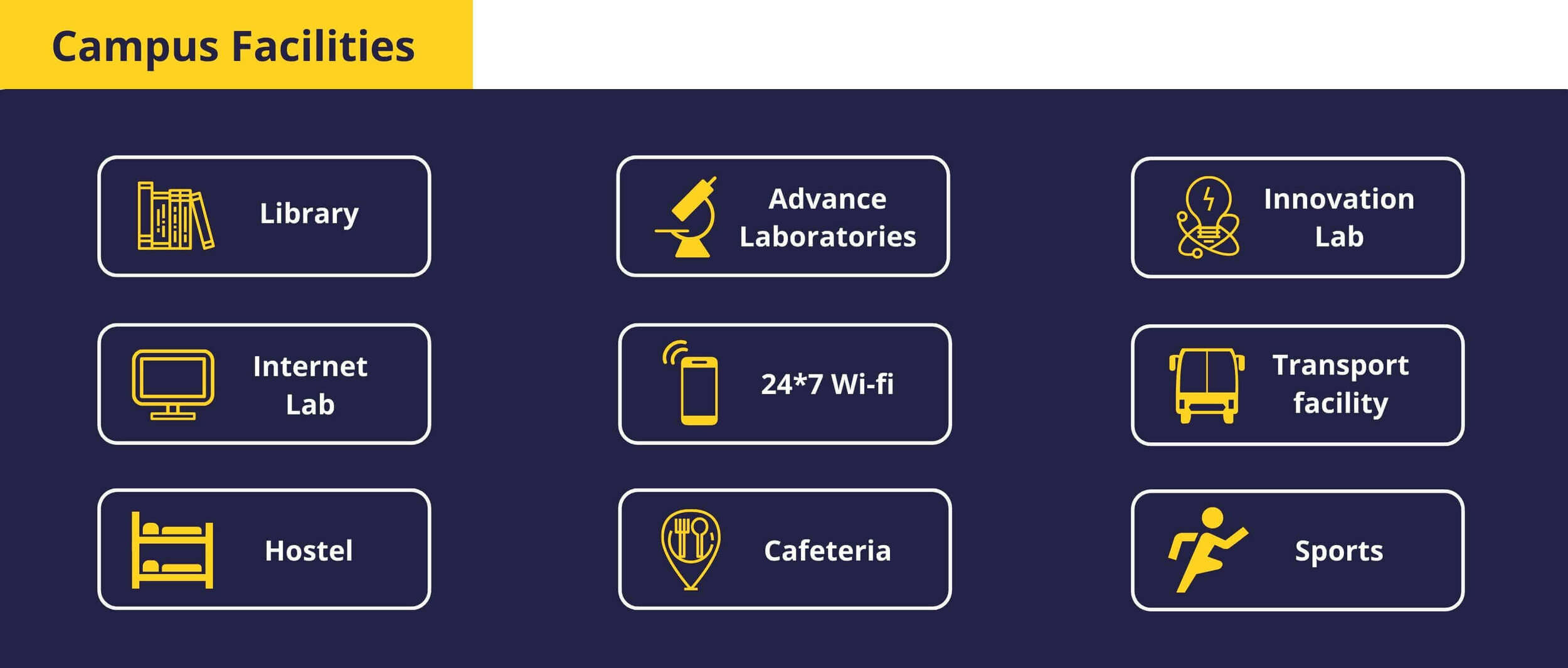
M.Tech in Power System Engineering
ADMISSION OPEN
Quick links
Fees
Placement
Scholarship
M.Tech in Power System
Masters of Technology in Power Systems Engineering is a two-year professional program in the field of electrical engineering that provides a special focus on power systems. It involves using state-of-the-art techniques such as Stability Evaluation Planning, Industrial Electronics and Controls, Reliability and Forecasting, Power Electronics and Drives, Wind and Solar Energy, Electric Conversion Systems, System Analysis of Power, etc.
Read more
There are multiple subjects covered during the course Power System Stability and Control, Advanced Protection of Power Systems, Smart Grid, Electric, and Hybrid Vehicles, Renewable Energy Systems, Operation and Control of Power Systems, Advanced Power System Analysis, Advanced Power Electronics, etc.
Further, the subjects like AI Applications to Power Systems, SCADA Systems and Applications, Machine Learning, and Soft Computing Techniques are also covered during the 2-year course.
Human Values and Professional Ethics, along with Research Methodology & IPR, are also, grey areas that the research scholars will get a chance to explore.
Vision of JIET
The vision of JIET is to create an education platform suitable for local, national, and international students looking forward to getting a high level of education with an appropriate focus on the industry needs and the students' future career goals. Moreover, the college is more focused on preparing students for upcoming challenges, ensuring they can easily overcome them and emerge victorious.
Mission of Jodhpur Institute of Engineering and Technology
To offer quality education according to the industry standards and share more knowledge about the subjects practically and realistically. Aims towards shaping the career of the students with tailored approaches for different students To understand students' difficulties and provide the best resolutions to mitigate the issues. Work on improving the strength of students and dealing with their weaknesses so that they can be ready for the future once they complete their post-graduation To bring out the best ability from the students through unique but legit approaches and show them their true potential
Course Highlights
| Course level | Post-Graduate |
|---|---|
| Duration | 2 Years |
| Examination Type | Semester System |
| Program Eligibility | A bachelor ’s degree (BE/ B.Tech.) in Electrical Engineering/ Electrical and Electronics Engineering or relevant branch (As mentioned in AICTE APH 2020-21) with an average of 60% or higher marks.
Basic understanding of power systems and mathematics is desirable. |
| Admission Procedure | Interested and eligible candidates should apply through the prescribed application form available online at www.jietjodhpur.ac.in/jietsat from July 17, 2021.
Note: Selected applicants need to confirm admission by submitting requisite documents in original and depositing the prescribed fee. |
| CURRICULUM | M.-Tech.-Power-Systems-Scheme & Syllabus.
|

-
One and only Engineering college of Rajasthan Accredited by NAAC with “A” Grade
-
First engineering college of Rajasthan to receive autonomous status from UGC
-
Cutting edge curriculum as per industry standards
-
Curriculum focuses on in-depth knowledge of practical skills
-
number of teaching and research laboratories and facilities
-
Central & State Government, and JGI scholarships
-
free placement assistance programs with excellent placement record
-
highly specific and geared industry oriented training to students
-
Highly experienced, well qualified & stable faculty from IIT & BITS
Why M.Tech in Power System Engineering from JIET?
Smart Lab with latest type of equipment
Opportunity to earn Industry- recognized Webinar and Induction program certificates
Research environment with availing necessary resources
24 hrs. working permission in research labs
Hardware-based learning by training programs and collaborations with industries
Cipher Schools as our Knowledge partner
300+ hours of Blended Learning
Affiliated with Bikaner Technical University
Approved by AICTE
Great Alumni Support

About Us
+ About Course
The Masters of Technology (Power Systems) is a two-year postgraduate program that provides students with the skills to immediately impact the job market and become leaders in the sector. To be eligible for this M.Tech. Program applicants must hold a 10+2 certificate, a Bachelor of Engineering/ Bachelor of Technology, or an equivalent qualification in a preferably science-related field from a recognized university. Those who successfully complete the program can seek employment in various sectors such as Atomic Power Stations, Biomedical Electronics, Electricity Boards, Hydroelectric Power Plants, etc. Popular job roles include Power System Engineer, Electronic and Telecommunication Engineer, and many others.
+ Building Blocks
- Core curriculum: EE department, JIET, being autonomous, has floated a program curriculum including subjects based on the latest technology and current research-oriented topics, which includes smart-grid, power system analysis, renewable energy course, software and virtual labs for providing knowledge of simulation and programming for industry-centric problems.
- Laboratory Skills: The EE department has got a well-established “smart lab”, funded and affiliated by AICTE MODROBs, with the availability of the latest technology equipment like power analyzer, high rating equipment and instruments for their measurement, drives application-related panels, fault simulation panels, PLC panels, solar plant equipment, etc. By the end of the program, one will have proper exposure and knowledge of types of equipment and their application for any power domain problem.
- Software Skills: With increased automation and digitalization of controlling techniques, software learning has become a basic need in every research domain. Because of this, the department provides learning of various EE domain-related software like MATLAB, Mi-Power and PS-CAD.
- Hardware Skills: Along with complete theoretical knowledge of the EE domain, an individual should have practical knowledge about the concerned domain, which will help them implement real-time problems. The department provides learning for various experimental equipment and labs developed to mimic industry-oriented issues during the course.
- Research Skills: To accomplish the post-graduate program with a specialization, a good dissertation/ research project gives an edge to the domain knowledge. The department avails all the necessary facilities for developing a good research work like subject knowledge of research methodology, avails the facility of downloading currently published research papers, technical support for paper writing, plagiarism checkings software like Turnitin, and funding support paper publishing in journals and conferences.
- Inter-disciplinary projects and tie-up with industries: The department is very active in conducting webinars and induction programs for the latest technologies. The eminent speakers of various fields and industries deliver lectures and share their research experiences. This exposure helps an individual to extend his knowledge.
+ Syllabus
M.Tech in Power System- Syllabus
+ To know more
For course related information:
Mr. Vinit Mehta
For admission related information:
Mr. Naveen Lodha
FAQ
Why JIET for M.Tech in Power Systems?
- JIET is a popular college for engineering in Jodhpur, Rajasthan
- It offers study materials, research papers, and practical insights into different aspects of power systems
- The faculties help students understand various aspects of the power system so that they can become ready for their future
- JIET has a training and development cell to help students with their careers and counsel them about their difficulties
- The world-class campus comprises all facilities one will need to understand the practical and theoretical concepts of power systems
- All the students are welcomed with open arms and allowed to share their ideas and opinions on different real-time projects.
Why Choose Power System?
- Engineers with M.Tech in power systems can opt for several roles and responsibilities like line design engineer, power supply engineer, and power distribution and transmission engineer.
- The demand for power system engineers is high across several industries, from automobiles to electrical.
- Most jobs for power system engineers come with high-paying packages, with opportunities to work abroad.
- Students can also work in the government sector and handle large projects.
- It is easier to apply innovation and creativity in designing power systems, line designing, etc.
- Engineers with specialization in power systems have the leverage to do something out-of-the-box and invent new solutions to existing industry problems.



